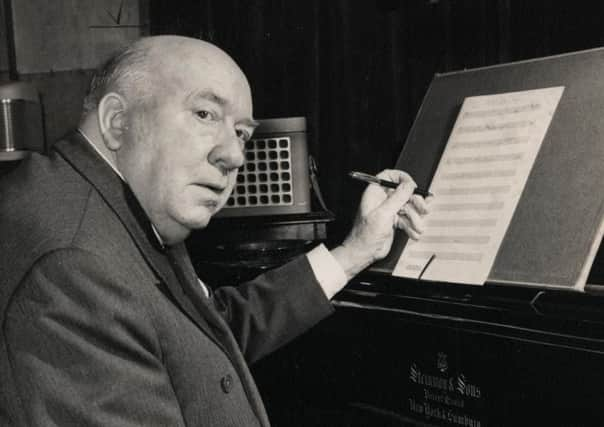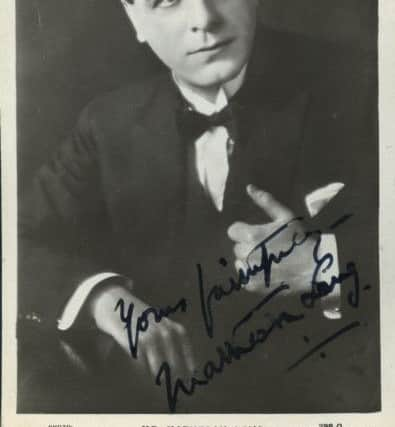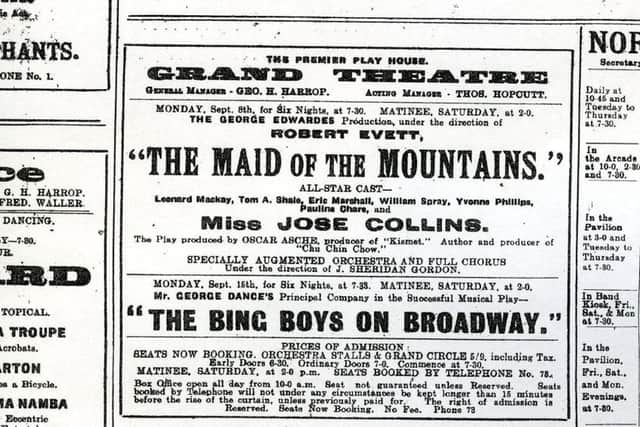Barry Band: Blackpool's morale-boosting shows distracted a war-weary public


None of us can remember it but those paragraphs can be little markers of local history.
Little has been written about what was on at Blackpool’s theatres 100 years ago but there’s a story to tell (he said, hopefully) using the Grand Theatre’s list of programmes as examples.
Advertisement
Hide AdAdvertisement
Hide AdFirst, there were no dramatic plays with war themes. The carnage of the war was revealed in the casualty lists in the newspapers. On stage nearly everything was glamorous and fancy-free in comedies, musicals and revues (songs and sketches). One revue seen at the Grand in May, 1918, was Khaki and Blue, with songs by Lawrence Wright, the composer who was to have many Blackpool connections.


The second discovery is that some shows returned several times during World War One and the following months. As many as eight times!
One of the few shows with a star name I recognised was The Purple Mask, a romantic comedy with Matheson Lang, whose Grand appearances spanned 30 years.
The main problem facing stage producers for London shows and tours was the shortage of men. After conscription started in 1916, the problem became acute. Many an ageing matinee idol had his career extended and promising juniors stepped up to adult roles. The theatre programme often had a panel stating: No member of the cast is eligible for military service.
Here are some of the shows that made many weekly visits.


Advertisement
Hide AdAdvertisement
Hide AdStanley Houghton’s northern play Hindle Wakes made eight visits from 1915 to 1919. A musical titled Betty made eight visits over the same period.
A more famous musical, The Maid of the Mountains, made six visits from 1917-19 and broke the Grand’s weekly cash record on its final visit. Several shows made five visits over a similar period.
War dramas were “off limits” but a morale-boosting wartime tale was welcome. An example was Seven Days Leave, which began a London run of 711 performances in February, 1917, with a touring company making the first of four Grand Theatre visits in July, 1917.
It was a spy drama set on the east coast. An officer on leave led local heroes in foiling a German plot. The public would not accept anything by writers with German sounding names.


Advertisement
Hide AdAdvertisement
Hide AdWhen an American musical titled Soldier Boy opened in London in June, 1918, and came to the Grand in May, 1919, the Hungarian-born composer Sigmund Romberg was listed as S Rombeau, which sounded French.
He got his name back with his 1920s hits The Student Prince (1924), The Desert Song (26) and The New Moon (28).
In the 1920s no producer wanted a stark reminder of the war and it was 10 years before it appeared in the form of RC Sherriff’s Journey’s End.
Even then, the main London houses turned down the play and it was left to Maurice Browne, a founder of the American Little Theatre system, to present it with a stage society in London in December, 1928. It starred the young Laurence Olivier, who had another role waiting and was not with the play when it became a huge hit in London and New York and first visited the Grand in October, 1929.
And that, effectively, dropped the curtain on the Roaring Twenties!